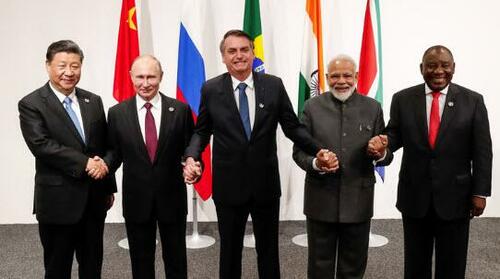"Empires fall and rise. Currencies fall and rise. Wars have winners and losers..."

Despite all the amplification of sanctions threats by the media, and vilification of anything Russian by western leaders, many of the world's largest nations (by population and economy), are continuing to adjust to current conditions, ignoring the virtue-signaling, and sending Russia's currency and current account balance soaring.
But, in yet another example of the far-less-unified-than-Biden-claims new world order, it appears Indian industrialists have no problem dealing with Putin for their key materials.
The latest example comes from India as Reuters reports that UltraTech Cement - India's biggest cement producer - is importing a cargo of Russian coal and paying for it using Chinese Yuan.
UltraTech is bringing in 157,000 tonnes of coal from Russian producer SUEK that loaded on the bulk carrier MV Mangas from the Russian Far East port of Vanino, the document showed. It cites an invoice dated June 5 that values the cargo at 172,652,900 yuan ($25.81 million).
The increasing use of the yuan to settle payments could help insulate Moscow from the effects of western sanctions imposed on Russia over its invasion of Ukraine and bolster Beijing's push to further internationalise the currency and chip away at the dominance of the U.S. dollar in global trade.
"This move is significant. I have never heard any Indian entity paying in yuan for international trade in the last 25 years of my career. This is basically circumventing the USD (U.S. dollar)," a Singapore-based currency trader said.
India has explored setting up a rupee payment mechanism for trade with Russia, but that has not materialized. Chinese businesses have used the yuan in trade settlements with Russia for years.
"If the rupee-yuan-rouble route turns out to be favourable, the businesses have every reason and incentive to switch over. This is likely to happen more," said Subash Chandra Garg, a former economic affairs secretary at India's finance ministry.
An Indian government official familiar with the matter said the government was aware of payments in yuan.
"The use of the yuan to settle payments for imports from countries other than China was rare until now, and could increase due to sanctions on Russia," the official said.
Finally, we are reminded of what First Deputy Managing Director Gita Gopinath of the International Monetary Fund (IMF) told The Financial Times earlier in the year: that the recent financial sanctions imposed on Russia for its invasion of Ukraine are threatening to weaken the dominance of the U.S. Dollar as the world currency,
Russia had been planning for years to reduce its dependence on the petrodollar since the United States imposed sanctions in retaliation for its annexation of Crimea in 2014.
The current crisis in Ukraine has only accelerated those plans... and it now seems the entire BRICS group may be ready to cross the chasm as Bretton Woods III begins to form.
The implications, needless to say, are staggering (and, worse, while Zoltan Poszar does not explicitly state it, he clearly believes that world war is coming):
Empires fall and rise. Currencies fall and rise. Wars have winners and losers.
When Wellington beat Napoleon, the trade was to buy gilts. I am no expert on geopolitics, but I am an interest rate strategist and I think the level of inflation and interest rates and the size of the Fed’s balance sheet will depend on the steady state that emerges after this conflict is over. Three is a magic number:
The four prices of money are managed via Basel III and central banks as DoLR.
The four pillars of commodity trading are shaped by war, hopefully not WWIII.
The new world order will bring a new monetary system – Bretton Woods III.
A BRICS-based payment system would be the ultimate challenge to the dollar-hegemon-based system in place today.
At a BRICS summit earlier this month, Russian President Vladimir Putin said that the bloc, consisting of Brazil, Russia, India, China, and South Africa, is currently working on setting up a new global reserve currency that would be based on the currency basket of the five nations. Earlier, the bloc said it was working on establishing a joint payment network to abate the reliance on the Western financial system.
Even if this is nothing but talk, it underscores the fact that the dollar is on shaky ground. US policymakers would be wise to consider future dollar weaponization carefully.

No comments:
Post a Comment